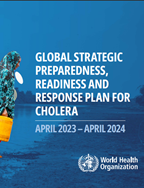The WHO Global Clinical Platform forms to support the case management of cholera
Background
In 2022, 44 countries reported cholera cases, a 25% increase from the 35 countries that reported cases in 2021. This trend continues into 2023. The recent outbreaks have also been more deadly, with case fatality rates being the highest recorded in over a decade.
After exposure to a source of Vibrio cholerae in contaminated food or water, cholera symptoms may develop 12 hours and 5 days later. While the majority of symptomatic people have mild or moderate disease, severe watery diarrhoea and dehydration can be fatal. With early and well-organised treatment, mortality should be less than 1%.
High case fatality rates during outbreaks are of particular concern. The reasons for poor relate to access to treatment, lack of identification of symptoms and a delay in reaching treatment. However, even at healthcare facilities, patient factors, co-morbidities, and the quality of clinical care may determine patient outcomes.
The treatment of adults and children with cholera may be improved by understanding better how they initially presents, and how their condition changes.
Purpose
The WHO Global Clinical Platform for cholera was launched in 2023 to collect patient-level anonymized clinical data to understand of clinical features and outcomes.
Overall objectives:
- Describe the clinical characteristics of cholera;
- Assess the variations in clinical characteristics of cholera;
- Identify the association of clinical characteristics of cholera with outcomes; and
- Describe the temporal trends in clinical characteristics of cholera.
WHO invites Member States, health facilities and other entities to participate in the global effort to collect anonymized clinical data relating to suspected or confirmed cases of Cholera and contribute data to the WHO Global Clinical Platform.
Data ownership and collection
Our collaborators maintain ownership of their data and have direct access to it.
Data contributed to the platform helps WHO to support member states in understanding the health problems from national and international perspectives. Health care facilities/collaborators around the word have contributed clinical data to the WHO Clinical Data Platform. The WHO would like to extend sincere thanks to all the contributing facilities and collaborators.
How to contribute data
You may contribute data from your facility, research group or other source of health data, provided you have the appropriate local permissions to do so.
Data sources for the platform
- Direct entry into the electronic WHO Platform using data forms (REDCap)
- Sharing established databases, for example from research collaboration.
Steps to contribute to the platform
- Review the terms of use of the platform
- Create your profile by registering here
- After a few days, you will receive an email with the login credentials to access the WHO Platform, or, if you are sharing an established database, additional instructions to contribute data.
Case report form
WHO has developed a clinical characterization case report forms (CRF) to standardize data collection of clinical features of cholera among hospitalized cases.
Additional resources

Contact us
For any additional questions, please contact: global_clinical_platform@who.int

/country-readiness-strengthening-(crs)/health-care-readiness-(hcr)/who_cdp_branding_rgb_cholera_white_bg.tmb-1920v.png?sfvrsn=964117e1_1)